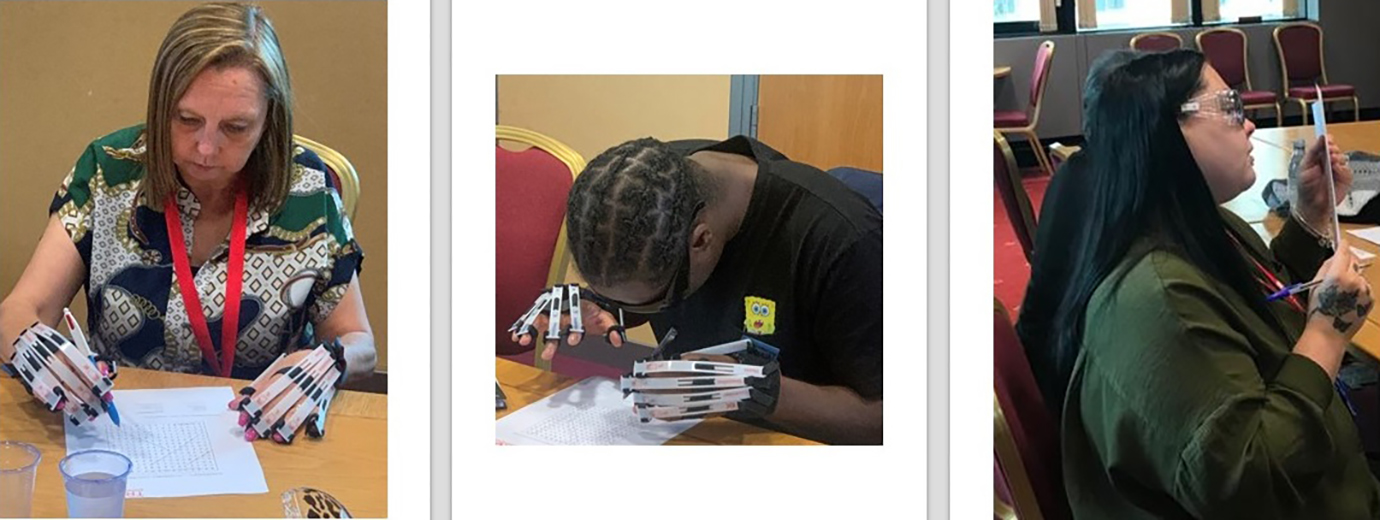The Value of Lived Experience and Experiential Labs: Bridging the Gap in Understanding Vulnerable Circumstances
- 13 October 2023

This week’s blog comes to you on World Sight Day and at the end of Arthritis Awareness Week 2023. Whilst there are many organisations raising awareness of sight loss or visual impairment or living with arthritis who we wholeheartedly support, we have found that simply telling people about a vulnerable circumstance of set of characteristics of vulnerability doesn’t always garner the understanding and empathetic responses firms may be hoping for. Sharing information and experience delivers a more long-lasting and impactful outcome and so we use a combination of techniques in our work with organisations looking to better understand vulnerability. We’ve created a set of Info Cards which share key stats and facts about living with various conditions (all sourced from the NHS), but we also utilise lived experience and experiential labs. In this blog, we will explore the significant value of using lived experience and experiential labs to improve awareness and understanding of vulnerable circumstances.
Empathy, understanding, and compassion are essential qualities that help build a more inclusive and compassionate society and workforce. However, truly comprehending the struggles and challenges faced by individuals in vulnerable circumstances can be challenging for frontline customer facing teams who have perhaps never met anyone with dementia or a chronic health condition or experienced bereavement for themselves. To bridge this gap in awareness and understanding, the use of lived experience and experiential labs has gained prominence and importance in training and coaching sessions. These innovative approaches offer a powerful means of educating and exposing individuals to the real-world challenges that vulnerable populations encounter.
Lived Experience: A Transformative Teacher
Lived experience, in its essence, refers to knowledge gained through personal encounters and direct involvement in particular circumstances. Individuals who have experienced vulnerability firsthand often possess a deep well of wisdom and empathy that can be harnessed to create meaningful change when developing products, services and reasonable adjustments for additional support which cater for all customers including those experiencing vulnerability. Lived experience brings;
1. An Authentic Perspective: Lived experience brings a level of authenticity and credibility to discussions surrounding vulnerability. When people who have faced adversity share their stories and insights, it makes the challenges they've faced more relatable to those who may not have experienced them directly.
2. A Human Connection: Stories of lived experience connect people on a human level, providing a view into the thoughts, attitudes and emotions experienced. Exposure to real life experience reminds us that, regardless of our backgrounds, we share common emotions and aspirations. This connection forms the basis for empathy and understanding.
3. Real-World Insights: Lived experience offers practical insights into the day-to-day realities of those in vulnerable circumstances. These insights can help policymakers, customer facing teams and senior leaders, to make informed decisions and design more effective support systems.
Experiential Labs: Bridging the Empathy Gap
When accessing lived experiences is not possible, experiential labs can fill the gap. Experiential labs are structured environments or activities that simulate real-life situations or challenges faced by individuals in vulnerable circumstances. These labs enable participants to walk in the shoes of others, fostering empathy and a deeper understanding of the issues at hand.
Immersive Learning: Experiential labs create immersive learning experiences. Participants are confronted with the physical, emotional, and psychological aspects of vulnerability, making it easier for them to grasp the magnitude of the challenges faced.
Emotional Impact: By putting participants in emotionally charged scenarios, experiential labs evoke strong feelings. This emotional impact leaves a lasting impression, motivating individuals to take action and effect change.
Personal Growth: Experiential labs encourage personal growth and self-reflection. Participants gain a deeper understanding of their own biases and assumptions, promoting more empathetic and open-minded attitudes.
Using Lived Experience and Experiential Labs within a Learning Environment
When working with clients on recognising vulnerabilities and making reasonable adjustments, we design and create learning experiences aiming to develop understanding and embed knowledge. We access real people who are willing to share their real-life experiences, where possible we find willing volunteers from within the organisation, or we share videos and testimonies from those who were willing to be recorded to share their messages.
We also include experiential labs sessions in which we use simulation tools to help the attendees to be able to step into the shoes of a customer with characteristics of vulnerability and try to complete an every-day task. These exercises are used to improve awareness and understanding of vulnerable circumstances.
These simulations include;
1. Financial Vulnerability Simulation: participants are asked to complete a real-life situation or set of situations with limited financial resources. The simulations expose the challenges faced by low-income individuals or families and develop a more compassionate perspective. These sessions have been particularly effective with debt-management advisors.
2. Healthcare Simulations: participants are provided with simulation tools e.g., simulation glasses or gloves which remove sensitivity in fingertips or simulate arthritis or even experience tinnitus or hearing loss and are asked to complete simple everyday tasks. The tools help participants to better understand the impact of a visual or hearing impairment of the challenge of living with arthritis. It provokes improved understanding and significantly greater empathy.
3. Layered challenges: as consumers often face more than one vulnerability, we include layering of simulations in our workshops too.
In Conclusion
The value of using lived experience and experiential labs to improve awareness and understanding of vulnerable circumstances cannot be overstated. These methods tap into the power of personal stories, human connection, and immersive learning to create profound shifts in perspective and empathy. By engaging in these experiences, individuals can become more compassionate, informed, and socially responsible, contributing to a more inclusive and equitable world.
As we continue to strive for a more compassionate and empathetic society, lived experience and experiential labs offer us invaluable tools to bridge the gap in understanding vulnerable circumstances. Let us embrace these opportunities for growth, empathy, and positive change.
Find out more
To find out more about our Info cards, or lived experience and experiential labs and how you can get involved, please contact us



